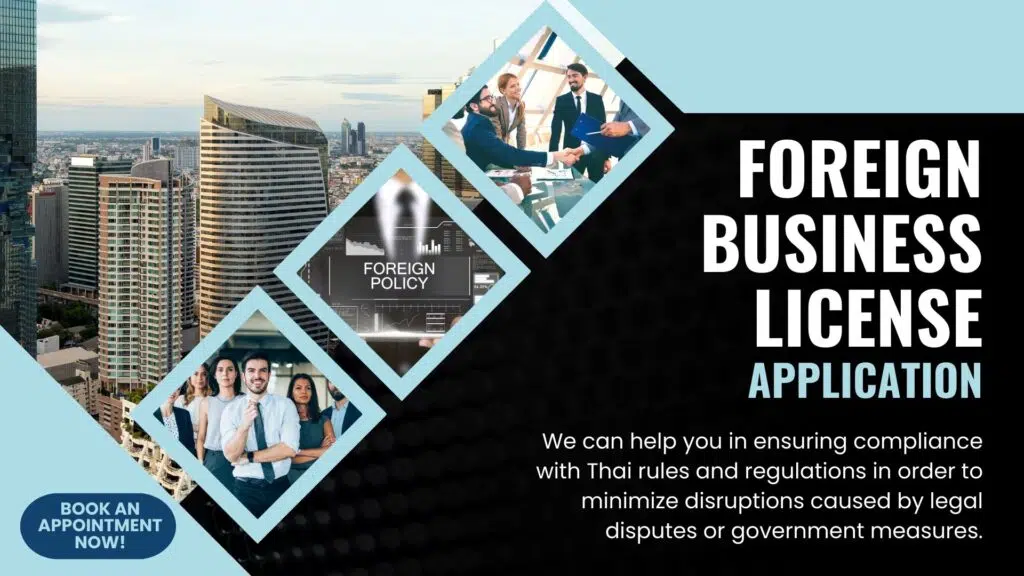Home » Corporate Business » Foreign Business License in Thailand

The Foreign Business License (FBL) is a type of license necessary for foreign companies doing business in Thailand. The Foreign Business Act (FBA) regulates foreign business activities in Thailand. According to the Foreign Business Act B.E. 2542 (1999), foreigners are prohibited from operating some categories of businesses, and some categories of businesses can be operated by obtaining a license or a certificate according to the Business Lists, as the case may be. This law categorizes business activities into three types:
These are Thai-only activities that foreigners are not permitted to engage in. This includes the following activities:
2. Transportation by land, by water and by air in the country, including domestic aviation
With the permission of the Director-General of the Department of Business Development and the approval of the Committee, these are the businesses that foreigners can engage in without restrictions:
2. Fishery especially of aquatic animal
3. Forestry from planted forest
4. Production of plywood, veneer, chipboard and hardboard
5. Lime production
6. Service-based businesses such as accounting services, law service business, architecture business, engineering service business, and advertising business.
7. Construction services except
8. Broker or agent enterprise except for
9. Sale at auction except
The most common type of license for international enterprises in Thailand is the Foreign Business License TYPE 3. It encompasses a wide variety of commercial operations that are neither expressly limited under Type 1 nor subject to constraints under Type 2. To conduct foreign business in Thailand, an investor must apply for permission under LIST 3 article 14 or 15 of the Foreign Business Act.
A Thai company must submit a principal approval letter to the foreign business department’s committee to decide if the firm can operate as a foreign business. Once approved, the corporation can transfer shares to a foreign shareholder. A license is necessary after a foreign company is established. However, a company with a minimum capital of 100 million baht can operate without a license, but must inform the Foreign Business Department before starting.
A foreigner intending to apply for a foreign business license must have the qualifications and not be under the following prohibitions:
When applying for a Foreign Business License in Thailand, you typically need to meet certain requirements and provide specific documentation. Here are some common requirements:
The business activity you intend to engage in should fall under the category of activities that foreigners are allowed to operate, either with or without conditions.
You must have a registered Thai company that is properly established according to Thai laws. This involves registering the company with the Department of Business Development at the Ministry of Commerce.
Depending on the type of business activity, there might be a minimum capital requirement that you need to meet. The amount of capital required can vary based on the nature of the business.
Furthermore, the minimum capital must be maintained until you cease operating a business in Thailand, and it can be held in numerous forms, such as fixed assets or current assets.
In some cases, there may be some restrictions on the foreigner’s percentage of shares that they can hold. The specific ownership proportion may vary depending on the company’s operations.
The permitted business must utilize a capital-to-loan ratio of 1:3. In other words, if the capital is 100 Baht, the company loan cannot exceed 300 Baht.
It is a requirement to produce documentation pertaining to the company’s shareholders and directors. Therefore, make passport copies, work permits (if applicable), and other appropriate identifications available.
Depending on the nature of your business activity, additional requirements might be specific to that activity.
In conclusion, the eligibility conditions for a Foreign Business License can be complicated and vary depending on the type of firm and any changes in Thai legislation. As a result, we strongly advise that you get legal assistance or speak with our professionals who are well-versed in Thai company rules and regulations in order to appropriately analyze your eligibility and handle the application procedure. Book an appointment now!

Magna Carta Law Firm website uses cookies. Further details are set out in our Cookies Statement. Necessary cookies (essential to make our website work) are always on. You can adjust your preferences using the 'View preferences' button in the footer of our website.